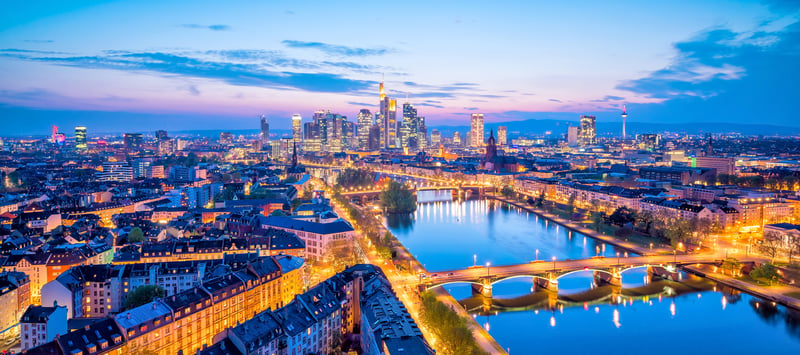Guide to hiring employees in Germany
Everything you need to know when expanding your workforce in Germany

Source: Shutterstock
Employment trends and job market analysis
Germany has a diverse population of over 84 million people, with a highly skilled talent pool that includes individuals from various educational backgrounds and experience levels. The country places a high emphasis on education, with a literacy rate of 99% and an extensive system of universities and vocational schools that offer degrees and certifications in a wide range of subjects.
Germany has some of the most comprehensive employment laws in the world, designed to protect workers' rights and ensure fair treatment. Those planning to work in Germany can expect a minimum wage, regulations regarding working days hours, vacation days, parental leave, and a robust social security system that provides healthcare, unemployment benefits, and pensions.
The business climate is favourable, with a strong focus on innovation and a well-established infrastructure that supports businesses of all sizes. Germany's business-friendly regulatory environment, low corruption levels, and government incentives for business growth and innovation make it an excellent place to set up a business.
Germany's top industries include automotive manufacturing, chemical production, engineering, and healthcare. The country is the world's leading exporter of cars, with major companies such as Volkswagen, BMW, and Mercedes-Benz headquartered in Germany.
If you're looking to hire employees in Germany, read our extensive hiring guide.
| Capital |
Berlin |
| Languages spoken |
Official: German Regional: Low Rhenish; Limburgish; Luxembourgish; Alemannic; Bavarian; Danish; Upper Sorbian, Lower Sorbian; North Frisian, Saterland Frisian; Romani, Low German Others: English, Turkish, French, Portuguese, Arabic, Albanian, Russian, Polish, Serbo-Croatian, Dutch, Italian, Greek, Romanian, Hindustani, Spanish, and others Signed: German Sign Language |
| Population size |
84.5 million as of April 2023 |
| Payroll frequency |
Monthly |
| Currency |
Euro (€) (EUR) |
| VAT |
Standard rate: 19% Reduced rates: 0% - 7% |
Payroll and taxes in Germany
VAT rates in Germany
The Value Added Tax (VAT) is an important source of revenue for the German government, accounting for a significant portion of the country's tax revenue. The revenue generated from VAT is used to fund various public services, including healthcare, education, and infrastructure development. Additionally, VAT plays an important role in promoting fairness in taxation, as it is a consumption-based tax that is paid by all individuals who purchase goods and services, regardless of their income level. The VAT system in Germany is as follows:
|
VAT rate type |
Percentage |
Examples of goods/services |
|---|---|---|
|
Standard |
19% |
Most goods and services |
|
Reduced |
7% |
Certain food items, books, newspapers and periodicals, admission to cultural events (e.g. theatre performances, museum visits) |
|
Reduced |
0% |
International transportation, certain exports |
Table 1: VAT rates based on goods/type of service
In Germany, payroll is calculated based on an employee's gross salary. Employers must deduct various taxes and contributions from their employee’s wages and pay them to the appropriate authorities. These taxes and contributions include income tax, social security contributions, unemployment insurance, and pension contributions.
Income tax
Income tax is the largest deduction from an employee's gross salary. In Germany, income tax is progressive, meaning that the more an employee earns, the higher their tax rate will be, as illustrated in the table below. The income tax rates range from 0% to 42%, depending on an employee's income level. Employers are responsible for deducting income tax from their employee’s salaries and paying it to the relevant tax authorities.
|
Taxable income range |
Income tax rate |
|---|---|
|
Up to €10,908 |
0% |
|
€10,908 - €62,809 |
14% |
|
€62810-€277,825 |
42% |
|
Over €277,826 |
45% |
Table 2: Income tax rates based on income range
Social security contributions
Employers in Germany are required to make social security contributions on behalf of their employees. These contributions fund the country's social security system, providing benefits such as healthcare (including long-term care insurance and nursing care insurance), unemployment insurance, and pensions.
Unemployment insurance
Unemployment insurance is a mandatory scheme in Germany that financially supports employees who lose their jobs. Employers are required to pay unemployment insurance contributions on behalf of their employees.
Pension contributions
Employers in Germany are also required to make pension contributions on behalf of their employees. These contributions go towards funding the country's public pension system, which provides financial support to retirees.
|
Type of deduction |
Description |
Employer contribution rate |
Employee contribution rate |
|---|---|---|---|
|
Income tax |
Deducted from an employee’s gross salary based on a progressive tax rate |
N/A |
Ranges from 0% to 42% |
|
Social security contributions |
Mandatory contributions paid by employers and employees to fund the country’s social security system |
7.3% |
11.3% |
|
Unemployment insurance |
Mandatory contributions paid by employers and employees to provide financial support to employees who lose their jobs |
1.2% |
1.2% |
|
Pension contributions |
Mandatory contributions paid by employers and employees to fund the country’s public pension system |
9.3% |
9.3% |
Table 3: Mandatory contributions for employees and employers in Germany
Minimum wage in Germany
Germany's minimum wage is €12 per hour as of October 1, 2022. This means employers must legally pay their employees at least €12 per hour worked.
The minimum wage was introduced in Germany in 2015 and has since been adjusted annually to reflect the cost-of-living changes. The minimum wage aims to ensure that all employees in Germany are paid a fair wage for their work and to prevent employers from exploiting their workers by paying them below a certain threshold.
It's worth noting that there are some exceptions to the minimum wage, such as for trainees, apprentices, and certain types of workers in the agricultural and forestry sectors. Additionally, some collective bargaining agreements between employers and trade unions may set different minimum wage rates for specific industries or job roles.
Labour laws and employee rights in Germany
In addition to the above legal requirements related to tax and payroll, there are also a range of other labour laws to be aware of when expanding your business to Germany. These are:
Occupational health and safety
German labour law dictates detailed regulations around workplace health and safety standards. These are outlined in the German Occupational Health and Safety Act.
The regulations state that all employers have a duty to ensure appropriate measures to protect their staff from dangerous employment conditions, with continuous supervision and analysis of potential hazards within the work setting.
Employers are also required to provide occupational health insurance as part of their mandatory social insurance scheme. This covers workplace accidents, occupational illness and accidents during the commute to and from work. Contributions to occupational accident insurance should come solely from the employer and depend on a number of criteria, including previous expenses for damages or risk level for their particular industry.
Non-compete restrictions
Generally, employees are subject to a statutory duty not to compete during their employment. This means that, during their time working for your company, they cannot work for a competitor of your company until the end of their notice period.
Any post-contractual non-compete restrictions should be agreed upon in writing and must provide for certain minimum payments to be made.
Short-time work
If your company experiences a temporary loss of workload and you want to reduce your staff's working time, German labour law allows for short-time work. Based on collective bargaining agreements, individual employment contracts or works agreements, this means you can reduce the contractual working time of your employees.
You may also apply to the Federal Labour Agency to receive help with paying for short-time work allowance. This is to cover the employee's loss of remuneration due to reduced working hours.
The loss of workload must be due to economic reasons, and the situation must be unavoidable and only for a temporary period. Short-term work allowances are regularly paid for a maximum of one year.
Trade unions and industrial action
Trade unions are usually established for different business branches, such as manufacturing, public transport or construction. Workers in Germany are constitutionally guaranteed the right to form or become a member of a trade union, or to refrain from doing so.
Employee benefits in Germany
In Germany, there are mandatory benefits that employers are required to provide their employees and supplementary/optional benefits that employers may choose to offer. Here are some examples of each:
Mandatory benefits in Germany
Health insurance: Employers must provide health insurance to their employees, with the employer and employee contributing to the insurance cost.
Pension insurance: Employers must also provide pension insurance to their employees, with employer and employee contributions to the insurance cost. The amount of the contributions is based on the employee's salary.
Unemployment insurance: Employers must provide unemployment insurance to their employees, with employer and employee contributions to the insurance cost. The insurance provides income replacement for employees who lose their jobs.
Accident insurance: Employers must provide accident insurance to their employees, with the employer paying the total cost of the insurance. The insurance provides compensation to employees who are injured on the job.
Maternity/paternity leave: Employers must provide maternity leave to female employees, with the length of the leave varying depending on the circumstances. In addition, fathers are entitled to paternity leave.
Supplementary/optional benefits
Retirement savings: Employers may offer retirement savings plans to their employees, such as 401(k) plans or pension plans that provide additional retirement benefits beyond what is required by law.
Health and wellness benefits: Employers may offer additional health and wellness benefits, such as gym memberships or wellness programs, to promote employee health and wellbeing.
Education and training: Employers may offer educational and training opportunities to their employees, such as tuition reimbursement or professional development programs, to help them acquire new skills and advance their careers.
Flexible working arrangements: As remote workers are increasingly common, employers may offer flexible working arrangements, such as telecommuting or flexible schedules, to help employees balance their work and personal lives.
Childcare support: Employers may offer childcare support to their employees, such as on-site daycare or subsidies for childcare expenses, to help working parents manage their childcare responsibilities.
 Source: Shutterstock
Source: Shutterstock
Working hours in Germany
In Germany, the maximum working hours are regulated by law to protect workers' health and safety. According to the German Working Time Act, the maximum weekly working hours are 48 hours. However, in most cases, full-time employees' average weekly working hours are typically around 40 hours per work week.
In addition to the maximum weekly working hours, the law also requires employers to provide a minimum of 11 hours of rest between working days, which means that employees must have at least 11 hours of uninterrupted rest between finishing one workday and starting the next. This ensures employees have enough time to recover and rest between work shifts.
It's important to note that there are some exceptions to these regulations for specific industries or job roles, such as shift workers, medical staff, or employees in the transportation sector. In these cases, different regulations may apply to ensure the safety and well-being of workers.
Starting in 2023, employers in Germany will be required to record the start and end times of their employees' daily working hours. This is no longer optional; employers must ensure that their employees record their working hours. The method of recording is not specified and will depend on the circumstances of the individual case, such as the industry, size of the company, and specific employee group.
It's also worth mentioning that Germany has a strong culture of work-life balance, and many employers offer flexible working hours or part-time employment options to their employees. This allows workers to balance their work commitments with their personal lives and is often seen to boost employee satisfaction and productivity.
Overtime pay
The compensation for overtime in Germany does not necessarily require employers to pay their employees an additional amount for working beyond regular working hours unless specified in the employment contract. If the contract allows it, a certain amount of overtime may be compensated with the regular monthly salary, up to 15% of the regular working time. Employers must pay for any overtime above this amount. If the overtime compensation exceeds the pension insurance contribution ceiling, the regular monthly salary may compensate for the overtime.
Working on weekends
Unless specific exceptions exist, working on Sundays and public holidays is generally prohibited in Germany. If an employee does work on these days, the employer must compensate them with time off within two weeks for Sunday work or eight weeks for public holiday work.
Night shifts
Night work in Germany is allowed for a maximum of 8 hours per working day but can be increased to 10 hours if the employee's average shift duration in the following month does not exceed 8 hours. Employers must provide appropriate compensation such as paid days off or a suitable supplement to the worker's salary for working during night hours.
 Source: Shutterstock
Source: Shutterstock
Types of leave available in Germany
In Germany, there are several types of leave available to employees, including:
Annual leave
Employees are entitled to a minimum of 20 days of paid vacation per year, which increases with seniority and may be specified in employment contracts. Some collective bargaining agreements provide for even more vacation time.
Public holidays
There are nine public holidays in Germany, which vary by region. Employees are generally entitled to paid time off on these holidays, although some industries (such as healthcare and hospitality) may require employees to work these days.
|
Holiday |
Date |
|---|---|
|
New Year’s Day |
January 1st |
|
Good Friday |
Varies by year |
|
Easter Monday |
Varies by year |
|
Labour Day |
May 1st |
|
Ascension Day |
Varies by year |
|
Whit Monday |
Varies by year |
|
Day of German Unity |
October 3rd |
|
Reformation Day |
October 31st |
|
Christmas Day |
December 25th |
|
Boxing Day |
December 26th |
fTable 4: Public holidays in Germany
Note that some of these holidays may be observed on different days depending on the state or region in Germany.
Sick leave
Employees who cannot work due to illness or injury are entitled to paid sick leave, which typically begins on the third day of illness. The length of sick leave varies depending on the employee's illness and length of service.
Maternity/paternity leave
In Germany, maternity benefits are available to pregnant and working women. These benefits are designed to support women during their pregnancy and after the birth of their child. The statutory maternity leave in Germany is 14 weeks, which can be taken up to 6 weeks before the expected due date. During this period, the employee receives a maternity allowance, which is calculated based on her average earnings in the last 12 months before the start of the maternity leave. The health insurance provider pays the allowance and is up to 100% of the net income.
Male employees are entitled to a minimum of two months of paternity leave, which may be taken immediately after the birth of the child or later.
Parental leave
In addition to maternity and paternity leave, employees are entitled to parental leave of up to three years for each child, during which time their job is protected. Either parent can take parental leave and may be taken full-time or part-time.
Other leave
In addition to the above, employees may be entitled to other types of leave, such as bereavement or jury duty, depending on their circumstances and employer's policies.
 Source: Shutterstock
Source: Shutterstock
Attracting talent in Germany
Germany is a top destination for job seekers worldwide due to its strong economy, high standard of living, and diverse culture. However, attracting and hiring the right talent can take time and effort for companies. This essay will explore the current employee engagement trends in Germany, the demands of job seekers, and recommendations for companies when hiring and sourcing talent.
Employee engagement trends in Germany
Employee engagement is a crucial factor for the success of any organisation. In Germany, employees value a positive work environment that fosters collaboration, creativity, and innovation. Studies found that German employees prioritise work-life balance, job security, and professional development opportunities. They also value feedback from their superiors and want to feel valued and appreciated in the workplace.
Another critical trend is diversity and inclusion in the workplace. German employees increasingly demand a diverse and inclusive work environment where they feel respected and supported regardless of gender, ethnicity, or sexual orientation. Companies prioritising diversity and inclusion can attract and retain top talent in the competitive German job market.
Demands of job seekers
Job seekers in Germany have specific demands when it comes to job opportunities. According to recent surveys, German job seekers prioritise the following factors when considering a job offer: salary, work-life balance, job security, and career development opportunities. They also value a positive work environment, a strong company culture, and a good reputation for the employer.
In addition, job seekers in Germany prefer to have clear communication and transparency throughout the hiring process. They expect a fast and efficient recruitment process, timely feedback, and regular updates on the status of their application. Companies that provide a positive candidate experience during the hiring process can increase their chances of attracting top talent.
Recommendations for companies
To attract and retain top talent in Germany, companies should prioritise employee engagement, diversity and inclusion and meet the demands of job seekers. Here are some recommendations for companies when hiring and sourcing talent:
- Offer a positive work environment fostering collaboration, creativity, and innovation: Prioritise work-life balance, job security, and employee professional development opportunities.
- Create a diverse and inclusive workplace where all employees feel valued and respected. Provide training and resources to support diversity and inclusion initiatives.
- Offer competitive salaries, benefits, and perks that meet the demands of job seekers. Communicate these benefits clearly during the recruitment process.
- Provide a positive candidate experience during the hiring process. Communicate transparently, provide timely feedback, and keep candidates informed throughout the recruitment process.
Attracting and hiring talent in Germany can be challenging. Still, companies that prioritise employee engagement, diversity and inclusion and meet the demands of job seekers can increase their chances of attracting top talent. Germany's current employee engagement trends emphasise the importance of a positive work environment, work-life balance, and professional development opportunities. Companies that provide these benefits and prioritise diversity and inclusion can create a strong employer brand and attract top talent in the competitive German job market.
 Source: Shutterstock
Source: Shutterstock
Hiring best practices in Germany
Advertising your roles
It is recommended to post on job boards, use global outsourcing and join professional networks in order to reach potential candidates in Germany. It's important to tailor your job postings to the local market and culture.
Posting your job advertisements in this way can also attract passive candidates, who may not be actively searching for work, but would be open to a new opportunity if they came across an attractive one.
The interview process
In Germany, the customary practice for job interviews is in-person meetings, as the country places significant value on formalities. However, over recent years, online interviews have gained popularity, aligning with the global trend.
Generally, one-on-one interviews are the standard, although panel interviews are also conducted. Candidates can expect the conventional Western interview format, including handshakes, small talk greetings, and adherence to a business attire dress code.
Reference checks
Background checks are legal in Germany, but they must comply with federal data protection laws. You can request information from your new staff related to their industry and job position, as long as you have their informed consent to conduct a reference check.
The onboarding process
Onboarding practices in Germany vary across companies. It is crucial to prioritise transparency by providing clear information about the position from the start. Additionally, ensure that important legal details are included in a written contract for the employee's records.
The fundamentals of onboarding an employee still apply in Germany. For instance, it is essential to familiarise the new employee with company policies and procedures, offer adequate training and development, and introduce them warmly to their team. Creating channels for feedback and addressing their needs through open communication is always beneficial. A well-executed onboarding process will yield valuable employees in the future.
It's also worth noting that this process may look different when onboarding contract vs. permanent roles.
Termination of employment in Germany
Termination of employment in Germany is subject to strict legal regulations and must be handled with care. Employers must comply with the relevant rules and requirements when terminating an employee’s employment.
Severance pay
Under German law, there is no statutory requirement for severance pay, except in cases where the employee is entitled to it under a collective agreement or an individual employment contract. However, employers may offer severance pay as a settlement agreement to avoid legal employee disputes.
Probationary period
Probation periods are standard in Germany and typically last up to six months. During the probationary period, the employer or employee can terminate the employment relationship without notice or severance pay.
Notice period
Notice periods for terminating employment are governed by law and may be extended by collective bargaining agreements or individual employment contracts. The minimum notice period depends on the length of the employee’s service with the company and ranges from four weeks to seven months.
In cases where the employer initiates the termination of employment, they must provide the employee with a written notice that includes the reason for the termination. The employee can challenge the termination in court if they believe it was unlawful.
If the employee has been employed for more than six months, the employer must also provide them with a certificate of employment. This document confirms the duration of the employment and the tasks and activities the employee performs during their time with the company.
Companies must follow legal requirements and regulations when terminating an employee’s employment in Germany. Failure to do so may result in legal disputes, compensation claims, or fines. It is recommended that companies seek legal advice and guidance to ensure compliance with the relevant laws and regulations.
 Source: Shutterstock
Source: Shutterstock
What are my options for hiring in Germany?
Airswift provides businesses in Germany with various solutions to simplify attracting local talent while ensuring compliance with local laws. Our extensive knowledge and experience minimise the risks of staff hiring and onboarding top talent in Germany, allowing you to focus on growing your business. At the same time, we take care of the administrative tasks.
Some of the options businesses can explore include:
Talent acquisition
We offer talent acquisition services, where our local professionals can hire contractors and high-quality employees in a competitive market. We also provide contract hiring services for short-term projects and flexible staffing solutions, so you do not have to compromise on quality when hiring for urgent needs. Our highly qualified contractor database ensures you get the best for your organisation.
For those looking for a more permanent staffing solution when hiring locally, our professional recruitment services can connect you with the best talents in Germany who meet your requirements.
Employer of record
If you are considering a remote hiring strategy but want to avoid setting up a physical office, our employer of record (EOR) service can help. As a third-party EOR, we handle tasks like paying employees' wages and providing them with statutory benefits, allowing you to focus on running your business without the hassle of setting up a local office.
Speak to an expert
*Although the information provided has been produced from sources believed to be reliable, no warranty, express or implied, is made regarding the accuracy, adequacy, completeness, legality or reliability of any information. For the latest information and specific queries regarding particular cases, please contact our team.
Table of Contents
Speak to an expert
Want to speak to an expert about hiring employees in Germany?
Get in touch